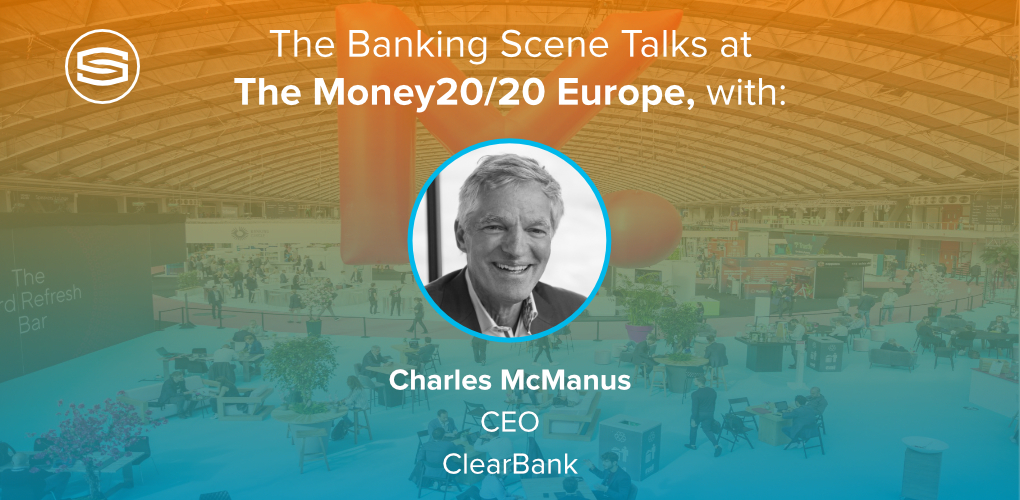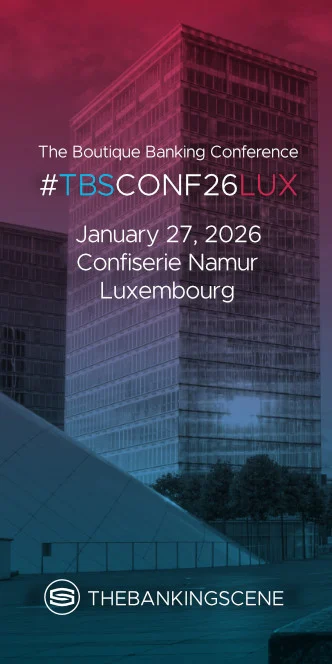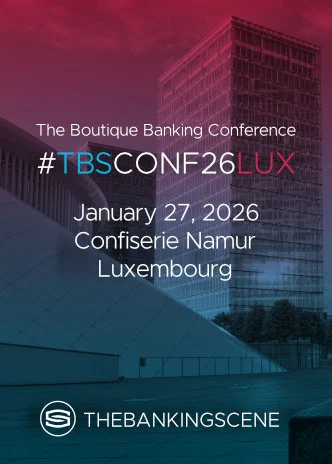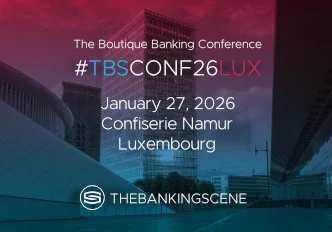
Insights & Opinions
The Banking Scene Talks at Money 20/20 EU, with Charles McManus, CEO of ClearBank
Tue, 05 Jul 2022


Money 20/20 Europe is unique in so many aspects. One is that it is the perfect occasion to talk to the shakers of industry and learn how they do things differently. We spoke to Charles McManus, who is the CEO of ClearBank. ClearBank is the UK’s first new clearing bank in more than 250 years. ClearBank offers banking services to financial service providers, FCA-regulated businesses and fintechs. ClearBank is neutral, independent and not constrained by legacy infrastructure.
ClearBank is quite unique in the market. What are you actually doing differently compared to similar value propositions in the market, and what makes it so hard to copy by others?
Charles McManus: There are four aspects of differentiation straight off the bat.
Number one is our embedded banking Financial Services Compensation Scheme (FSCS) product or “Deposit Protection” product. We are the largest platform player in delivering deposit-protected bank accounts to Fintechs in the UK, and we aim to be both in Europe and the US with our products.
For example, Tide in the UK now have a 7% market share in the UK, totalling 400,000 SMEs and all their bank accounts are with ClearBank. Instead of providing a prepaid card type solution, new customers download the Tide app, accept the T&C’s, click on ClearBank T&C’s and a bank account pops up, embedded in their app in relation to providing bank account services.
We’ve done the same in the retail consumer savings space with Chip, and we have a similar major client in the consumer savings space that we will be announcing in the future, essentially in Germany.
If I want to switch to get an interest product or a savings account of those players, actually, I open a ClearBank bank account tied to a savings account.
There are several other use cases, such as merchant acquiring, investment products and pensions, where again, using our bank account embedded into another provider’s financial platform, gives a whole range and allows those EMIs (e-Money Institutions) and authorised payment institutions to behave like a bank, but they’re not a bank.
So ClearBank takes away the complexity of tech, regulation and compliance, the back-office... They only need to take care of the sales, marketing and branding.
Charles McManus: Well, we almost sound being boring for a moment, but it’s okay because today it matters: AML, KYC, onboarding financial crime and conduct risk. Our clients want the customer, whether an SME or a consumer, and we oversee how they do that because if they miss-sell a bank account product, we are responsible, of course, but they are doing that first line.
So we have quite a big oversight. We don’t offer our services to a company that we’re not comfortable with or with one that doesn’t know how they behave because our banking license is at risk.
So yes, they can grow their business, but we oversee them to ensure that they’re not jeopardising our banking license in relation to conduct, AML, financial crime, or transaction monitoring.
That’s a big differentiator that we don’t believe either the big four in the UK or a number of the European payments providers currently offer.
Another example is our virtual account offering. Many people talk about virtual accounts “Are they IBAN addressable?” “Are they truly proper bank accounts that are independent?” “Are they also reconcilable?” If you’ve got 3 million customers, can you replicate them with your bank? 3 million bank accounts or virtual accounts, can you do an auto reconciliation on your own platform?
Many providers say that they provide these things, but in the RFP process, we see that our partners started with 20 banks, and in the end, only three could provide the product in terms of the true richness of the functionality, including ClearBank.
Again, what makes ClearBank so unique in providing this?
Charles McManus: That brings us to differentiator number two: we only do payments. We want to build our platform to be the best payment infrastructure in the UK and globally.
To do that, we don’t provide retail or business banking because we want to focus on being the best in payments infrastructure. Part of that is that we hold all of our clients' cash at a central bank and leave it there. That is not banking, right? That’s not what banks do. Banks manage financial risks; they borrow money and lend it and make a margin.
We do not lend a cent. We avoid financial risk and deal with operational risk. We provide payment finality, so to hold cash at the Bank of England, you must have a banking license.
So you become a client, you want to make a payment, you’ve got to fund your bank account for that payment, all that cash pound for pound sits at the Bank of England overnight, and we do nothing. Our balance sheet is +3 billion sterling, all held Bank of England.
Suppose everyone comes and asks for their cash to have it back today; it will go straight back out, and I’ll share capital reserves. No bank has that. We make money by charging monthly fees for our bank accounts.
The trust element is the third factor. Even though I’ve been in investment banking all my life, whenever things go wrong, the public or SMEs always go to the person with the deepest pocket, usually a bank. They always end up at the bank. If the FinTech screws up, normally, they won’t have any money, but if there’s a bank somewhere in the chain, they will normally get involved.
That’s when I talk about reputation. Even though we may not be liable for one another, we consider the banking relationship and trust factor paramount, so if you put your cash with us, you’ll always get your cash back. Very few banks in this world are that safe if you like in relation to doing it.
All this is linked to the cultural aspect. This was the other reason we were told by clients that actually selected us is agility, speed of decision making, and no other conflicts of interest. We will never compete for our customers’ customers.
What do I mean by that? If someone comes into us, a bank, thinking they have a new business customer proposition, I might take that idea and start doing my own retail banking. But I don’t have a retail banking or business banking arm, so they can share that information completely confidentially and help them build their business case and help them win. That opens up a very different trust-type relationship, but if we have other divisions we were competing over, they can’t.
Last but not least, differentiator number 4: I haven’t mentioned the technology affecting the rest. We believe the fact that we own the whole tech stack. We built it cloud-basic; our API has 32 endpoints; ISO 200222. You access all the payment schemes through one API, not just UK payment schemes but also SEPA Target2.
We will be on there shortly when we open our European bank, and so will the US and the rest. So we want to make it as easy as possible for anyone to give us payment messages, and we will send them through the payment schemes and send you a message saying “done.”
We have triple active-active-active, massive contingency programs, and all the rest, but no matter what, the unthinkable will happen. Therefore, you need to be ready and able to know exactly what you do.
Again, coming back to the culture, we run all our incident management live with all our customers in full transparency as part of our no blame, learning, building customer-first solutions, problem-solving, accountability, and responsibility.
That’s where you hear that you talk with FinTech seasoned entrepreneurs who know what they are talking about. From the beginning, you made sure you had those four elements in place. How are you going to copy that to Europe?
Charles McManus: We’re very good at connecting the platform to payment schemes worldwide, so new European schemes are straightforward because we’ve connected Faster Payment, and we know how to do that.
The tech side of it is the platform, and it was built to be multi-currency right from the start, so it’s a matter of scaling in relation to it. The product set will be the same, but we must comply with local jurisdictions. Although we’re setting up in Amsterdam, we’ll need possibly passporting to France and Germany.
We’re coming to the Netherlands to support cross-border payments in Europe because we need a country that’s actually got substantial FSCS protection within the country and that culturally aligns with ClearBank and recognises innovation.
Our first customers in Europe will be our existing UK customers with operations in Europe. Truelayer is an excellent example in the public domain. They would love us to be able to service them in euros as well as Sterling and US dollars.
Many of our customers don’t want to use different correspondent banks worldwide, and prefer ClearBank service for it all. So this time next year, I hope when we’re sitting here again with some exciting news of exactly where we are.
We want to be that reliability and infrastructure payments layer to empower everybody else to service their customer groups well.
So you provide payment services for others to focus on new business development?
Charles McManus: We’ve got some brilliant customers doing really exciting things. Take, for example, PEXA. They put the entire residential housing market on a database working with the government's land registry.
You can buy and sell your house, and all conveyancing is done on the PEXA platform. Your home is on the PEXA platform. You repay your mortgage; you take out a new mortgage on your new house, all on one platform. The chain in terms of the buyers and sellers across the whole chain is settled in real-time.
You can get your solicitor services, removal services, and house insurance across the supermarket at the best possible price and get on with your life, enjoying a new house. PEXA have done it in Australia, and they’re about to do it in the UK. They are planning to go around the world doing it.
ClearBank is powering the infrastructure for the whole UK housing market. We want to do it in other geographies too, whereby the consumer wins and gets resiliency, cost efficiency, and real-time service. That, to me, is what embedded banking and banking solutions should be about.
I guess next to the tech, talent and culture, another important aspect is building solid governance to support this kind of embedded finance propositions?
Charles McManus: Indeed, it’s all well and good giving somebody tools, but how do you know they’re using those tools in the right way? That is where the licensing aspect of ClearBank becomes an even bigger differentiator.
The FCA and the others are watching us as Wirecards happen and various other dodgy events, particularly in the EMI space, where we’re trying to raise the standards of all of those. It’s really interesting, and obviously, we’re highly regulated, but we want to be sustainable.
Our business grows by picking the right customers and making sure it’s ready and that we’ve done your due diligence.
This kind of business is not risk-free. You are putting your reputation on the line of a third party. That’s why we choose our embedded banking partners very, very carefully.



